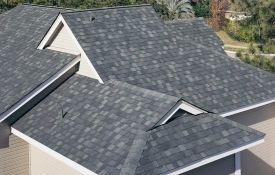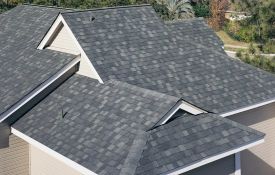
09 Feb Is Your Roof Ready?
Detecting Water Damage BEFORE the Storm

Here are several signs of past water damage that homeowners can watch for before summer’s rainy season to avoid costly roof and reconstruction repairs:
- Water marks on interior walls or ceilings are obvious signs of water intrusion. Every once in a while, look up; check the ceiling for small yellow stains, bubbling or flaking or peeling popcorn. Leaks resulting from damaged or deteriorated roof components such as flashing, shingles, and underlayment are a guaranteed source of roof, attic and interior damage. If you suspect you have water infiltration, be sure to check attic space, walls and ceilings – especially at corners and seams – and near points of roof penetration such as vents, skylights, and chimneys.
- Wood rot is another definite form of water damage and a potential point of progressive water intrusion. Regularly inspect the exterior of the home for exposed wood or dry rot; unfinished or unpainted wood is certain to result in further deterioration and can result in extensive water damage to surrounding areas. Look at wood trim on siding or stucco finishes, window and door framing, fascia and roof decking, if possible. Problems caught early can save a homeowner thousands of dollars on repairs.
- Mold and wood-decaying fungi usually develop in moist, warm areas or enclosed spaces with little or no ventilation. Be sure to look closely in the attic at walls and framing, including behind insulation and duct work as well as bathroom and closet walls. Check for peeling paint or wallpaper, moist or discolored drywall or carpeting, and staining along baseboards. Use caution; inhaling or touching mold or mold spores can cause allergic reactions and health problems; exposure can irritate the eyes, skin, nose, throat, and lungs of both mold-allergic and non-allergic people. According to the United States Environmental Protection Agency (EPA), indoor household mold cannot be completely eradicated, as some mold spores will be found floating through the air and in house dust. But spores will not grow if moisture is not present.
- Rust in the roof flashing is an indication that deterioration has taken place. Gaps and pinhole leaks in flashing and other roofing materials will result in water penetration and damage. A visual perimeter inspection will usually reveal signs of rust to a careful homeowner, but a licensed professional is always a better choice. Most contractors offer free roof inspections as part of the estimating process.
- Damaged or missing shingles and cracked tiles are indicators of potential water damage. Torn, lifted, and creased roof shingles are a common result of storm damage, and circular areas of missing granules, bruising, and spawling are a result of hail or high winds. Normal surface deterioration comes with time and will create vulnerable areas where leaks are likely to occur. The average life expectancy of a roof could range from 15-20 years for a shingle roof up to 30-50 years for tile. Whether it is a newer or a well-seasoned roof, an annual roof inspection by a professional roofing contractor is recommended to ensure that no damage is present.



